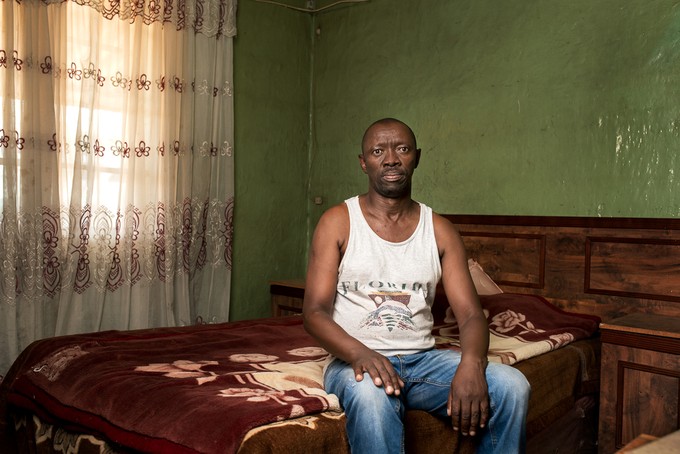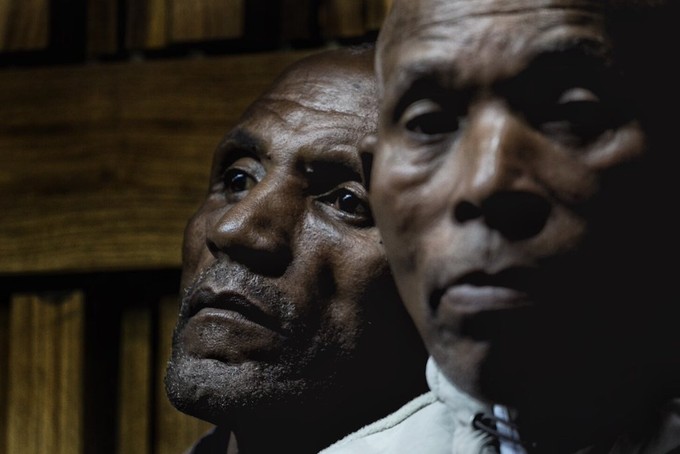Silicosis: miners win case for class certification
Obstacles remain before sick miners receive compensation but this is an important victory for them
Judge Phineas Mojapelo handed down judgement in the landmark silicosis court case this morning in the South Gauteng High Court. He certified two classes of miners, those sick with TB and those sick with silicosis. This means that miners who have had these diseases can bring a class action lawsuit against the mining industry. Here is the judgment (PDF, 5MB).
The court also ruled on the issue of transmissibility: families of dead miners can also sue the mines and be awarded general damages. This is a development in the common law.
One of the applicants, Luduko Enoch Madindala, travelled from Welkom, where he lives in an old mine house, to Johannesburg to hear the ruling. He contracted silicosis and TB while on the mines. He told his story to photographer Thom Pierce:
When the mines closed down they sold off the accommodation to the miners and their families. He worked on the mines for 29 years and played soccer for the mine team, The Lorraine Lions, at the weekend. “In the hostels we would stay with 15 people in one room. The food was bad, even the toilet was next to the kitchen. The bed was cement with a thin mattress and people would smoke in the rooms.” Madindala believes that the mines abused them. “We worked very hard and there was not enough money.” When he first started, they would earn R136 per month and by the end they were taking home R1,600 per month.”
“I feel very happy,” Madindala told GroundUp after this morning’s ruling. While he has received some compensation, he is hoping for more.

A lawyer involved in the case explained to GroundUp that now either the mines will settle, or there will be a class action lawsuit. If it continues to court, there will first be a determination of common issues to all miners. And then issues affecting individual miners will be dealt with. The court said that this is the only viable option for the mineworkers to have access to justice.
“The benefit of this ruling is that common issues can be dealt with in one big hearing,” said John Stephens, an attorney with SECTION27.
There was elation at court after the judgment. Lawyer for the miners, Richard Spoor, wrote on Facebook: “We won! Silicosis class action certified. Viva!”
A group speaking for the mining industry, The Occupational Lung Disease Working Group, responded to the judgment:
“The companies are studying the court’s decision. Each company is yet to decide whether to lodge an appeal against the finding.
Either way, it should be noted that the finding does not represent a view on the merits of the cases brought by claimants.
The companies remain of the view that there are issues related to compensation and medical care for occupational lung disease that need to be addressed through engagement between stakeholders, with a view to designing and implementing a comprehensive solution that is both fair to past, present and future gold mining employees, and also sustainable for the sector. They therefore remain committed to achieving these goals.”
Support independent journalism
Donate using Payfast

Don't miss out on the latest news
We respect your privacy, and promise we won't spam you.
Letters
Dear Editor
He died in 1980 after being transfered from the mines to East London Hosptal.
He contracted lung diseases and we as a family need compensation for our father May Sam.
He got compensation of R2700 in 2003 from mining companies via Eastern Cape Department of Health and Standard Bank.
How and where can we get help?
GroundUp Editor's Response
The best place to call is the law firm dealing with this case. They are as far as we understand expecting calls from people in your position, and can inform you if you qualify to join the class action lawsuit.
The company is Richard Spoor Inc: 011 482 6081. Please do give them a call.
© 2016 GroundUp. 
This article is licensed under a Creative Commons Attribution-NoDerivatives 4.0 International License.
You may republish this article, so long as you credit the authors and GroundUp, and do not change the text. Please include a link back to the original article.

